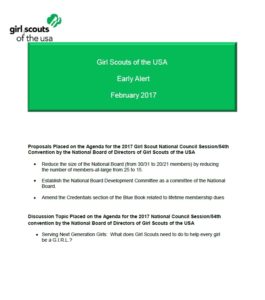A proposal is an item of business that is presented during the National Council Session. There are two types. The first – usually simply called a proposal – is for governance business and an “action item” to be voted upon by the National Council during the session. An example would be an amendment to the GSUSA Constitution. These votes are binding – meaning it’s expected that there will be a concrete result due to this action. The other is called a “discussion proposal” and outlines a topic that is discussed by the National Council to provide general guidance to the Movement. No votes are taken on this sort of item, although non-binding “straw polls” may be given to assess the feelings of the delegate body. The voting results for these sorts of polls are considered advisory.
Both local councils and the National Board of Directors can submit proposals for NCS consideration. Proposals by local councils require the approval of the council’s board of directors. If a council’s board approves a proposal, they may send it directly to GSUSA, but it’s best if the council first sends it to other Girl Scout councils asking for support. Councils who do support the proposal can submit a form notifying the National Board of that approval. The National Board sets the deadline to submit proposals which is usually a little over a year before the next NCS and also distributes forms which must be used to submit or support proposals from another council.
Per the GSUSA Constitution, the National Board of Directors recommends and determines which proposals will be added to the NCS agenda. However, if one is supported by 15% (for a total of 17) of all councils (meaning they’ve submitted a support form), it must be approved and added to the agenda unless it recommends an amendment to the GSUSA Constitution. If this is the case, then the National Board decides whether the proposal is appropriate or not regardless of how many councils support it. For more information about the pre-approval process, visit this GSG article.

Once the National Board has determined which proposals and discussion topic will be on the NCS agenda, an Early Alert is sent out to councils, usually about 8 months prior to the NCS. The Early Alert includes the potential discussion topic along with possible action items such as Constitutional amendments or to raise membership dues. Rationales for these proposals are included as well.
Later that year, a workbook for National Delegates is released by the National Board and GSUSA. This Workbook contains the final proposals along with their rationales, but note that they can still be withdrawn by the sponsoring body – whether it’s the submitting council or the National Board. The slates for the National Board and National Board Development Committee for the next term are also included in the Workbook along with short biographies of the board and committee members up for election. Last, the workbook traditionally has included standing rules for adoption for the meeting and a short but excellent review of parliamentary procedures typically used during NCS sessions. Additionally, GSUSA releases FAQ handouts and hosts webinars about the proposals leading up to the NCS.
The proposal process is just one way the democratic process is integrated into Girl Scouting by providing a communication path between the National Board/GSUSA and the membership serving on the National Council. It allows the National Council to fulfill its purpose as “the coordinating head of the Movement.”
